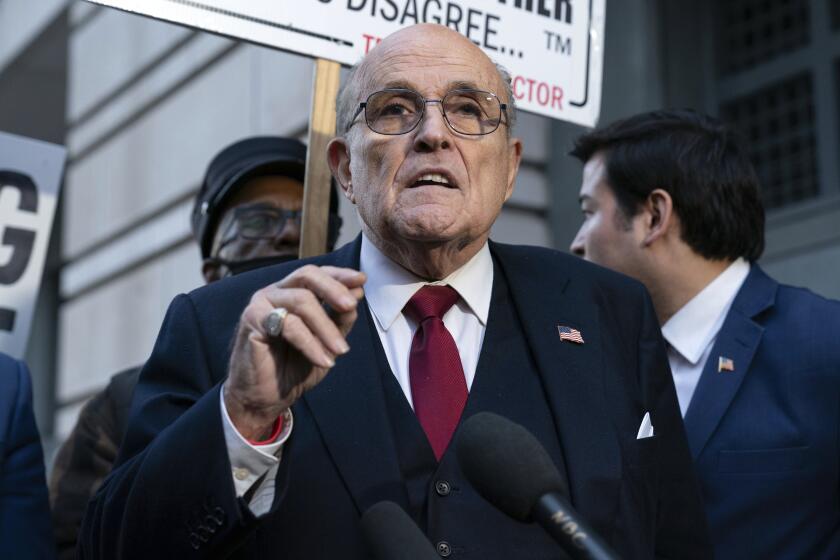Rift Opens Over Bosnia Air Strikes : Military: Boutros-Ghali insists he still has control over bombings. U.S. says streamlined plan bypasses U.N. chief.
A stark disagreement developed Monday between the Clinton Administration and U.N. Secretary General Boutros Boutros-Ghali over who has the right to order massive allied air strikes against the nationalist Serbs in Bosnia-Herzegovina.
While the Americans insist that they have worked out an arrangement with the British and French to put that power in the hands of British Lt. Gen. Rupert Smith, the commander of U.N. forces in Bosnia, Boutros-Ghali has countered that he still maintains the right to authorize or veto air strikes.
“The secretary general holds the key at the United Nations for the authorization of air strikes,” Ahmed Fawzi, his deputy spokesman, told a news briefing at U.N. headquarters in New York. “I can’t be clearer than that.”
But U.S. officials were adamant that a decision to change the authorization power had already been made at an allied conference in London on Friday and that the North Atlantic Treaty Organization is meeting in Brussels this week to approve detailed military plans for air strikes. The NATO council opened its session Monday but adjourned for a day to give planners more time to prepare.
Asked about Fawzi’s insistence that the power to bomb still resides with Boutros-Ghali, State Department spokesman Nicholas Burns said: “It’s certainly inconsistent with the decisions that were made in London. . . . Secretary General Boutros-Ghali was at the conference, and I don’t believe these types of reservations were raised [there]. Therefore, the United States and its allies intend to proceed at Brussels with putting into operation the decisions on air strikes.”
Echoing a popular view about the status of the U.N. mission in Bosnia, Burns suggested that Boutros-Ghali has little right to start challenging the United States, Britain, France and other allies now. “The United Nations is in a fairly precarious state in Bosnia,” Burns said. “The United Nations has not met its commitment to protect the people in Srebrenica.”
Many U.S. officials have blamed much of the U.N. failure on Yasushi Akashi, the secretary general’s special representative in the Balkans. While retaining the power for ordering air strikes, Boutros-Ghali delegated authority to Akashi last year to call for close air support to protect peacekeepers in danger. But Akashi has angered U.S. officials by vetoing several requests by Lt. Gen. Smith for air support.
The new plan, as described by the Americans, would bypass both Boutros-Ghali and Akashi and give Smith the authority to call in air power, including massive strikes.
The plan would also bypass French Gen. Bernard Janvier, the commander of all peacekeepers in the Balkans, who supported Akashi’s vetoes. At the United Nations, however, a French diplomat said he doubts that his government would agree to take Janvier out of the picture.
U.N. officials maintained that despite the American claim of an agreement on new procedures for air strikes, there is no formal agreement and that Boutros-Ghali would have to be consulted in working one out. The officials did not rule out the possibility, however, that the secretary general would agree to delegate all his authority to Smith.
“The secretary general is in constant contact with the secretary general of NATO . . ,” Fawzi said. “He [Boutros-Ghali] is working hard to improve the procedure. . . . He may decide to delegate it [authorization for air strikes] to Akashi. He may decide to delegate it to his generals. Discussions are going on now.”
Fawzi also raised the possibility that Boutros-Ghali may insist that massive air strikes cannot be unleashed without a new U.N. Security Council resolution. U.S. officials have dismissed this notion, stating that existing resolutions give NATO all necessary authority.
U.N. officials said that Boutros-Ghali bases his bombing authority on what is known as a “dual-key” arrangement set down in a secret agreement signed by the United Nations and NATO in late 1994. In general, the agreement provides that both NATO and the United Nations have to agree before the launch of air support or air strikes.
In a closed-door Security Council meeting Monday, Nigerian Ambassador Ibrahim A. Gambari asked British Ambassador David Hannay about the dual-key arrangement in the new allied plan for massive air strikes. Hannay replied, a European diplomat said, that “we will respect the established procedures.”
Burns insisted that the established procedures had been streamlined. He said the allies in London had “worked out a specific written agreement” that provides for the decision on bombing to be made jointly by Smith and U.S. Adm. Leighton W. Smith Jr., commander of NATO forces in southern Europe.
This view was reinforced by Defense Secretary William J. Perry, who told a news conference in Langley, Va., that the U.S., British and French generals who met Bosnian Serb army commander Gen. Ratko Mladic in the Serbian capital of Belgrade on Sunday night had delivered him a clear ultimatum: “If they enter Gorazde, if they attack Gorazde, that they will be met with a major air campaign against them.”
But Perry added that although the ultimatum was directed at Gorazde, a U.N.-designated “safe area,” “it also reinforced the view that we continue to have our concern and will continue to take actions relative to the other safe areas as well.”
On Capitol Hill, however, Senate Majority Leader Bob Dole (R-Kan.) belittled the new allied initiative and said he intends to call for a Senate vote today on lifting the arms embargo on Bosnia. Far from “shaking in his boots,” Mladic is “more likely laughing all the way to [the safe area of] Bihac,” Dole said.
Times staff writer Elizabeth Shogren in Washington contributed to this report.
More to Read
Start your day right
Sign up for Essential California for news, features and recommendations from the L.A. Times and beyond in your inbox six days a week.
You may occasionally receive promotional content from the Los Angeles Times.






